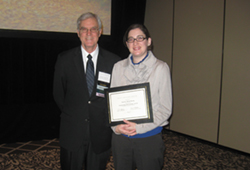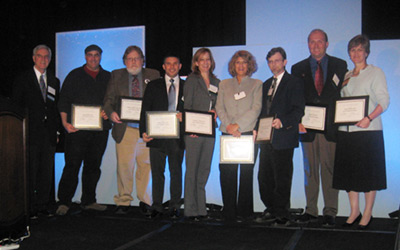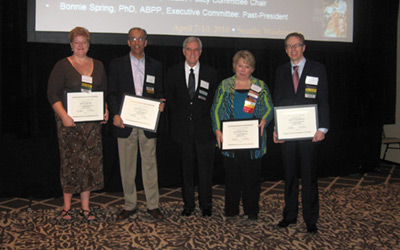

PRESIDENT'S MESSAGE
Society of Behavioral Medicine: Strengthening SBM, Ensuring our Impact

Karen M. Emmons, PhD
Karen M. Emmons, PhD, Society of Behavioral Medicine President
Two months into my year as SBM President, I am delighted to have the opportunity to share with you the key initiatives that I will be working on this year, along with our outstanding Board, Council and Committee Chairs, and our members. I inherited a society in strong shape, thanks to the leadership of my predecessors. We have weathered the current economic climate with a fairly stable membership, have had outstanding attendance at our last two meetings, and are about to launch a second journal. The Publications and Communications Council and the Editors are working together closely, and thinking about some innovative ways to connect the journals and provide synergy. In August, we will serve as hosts for the International SBM meeting which is shaping up beautifully thanks to the efforts of the many SBM members who have been actively involved in ISBM's Board and Program Committee. During the past year, Francis J. Keefe's, PhD, outstanding leadership focused on expanding our efforts in early career development to include consideration of career trajectory over the work lifespan. This has been important foundational work, and Frank has agreed to continue leading the Working Group on Career Trajectories in Behavioral Medicine, for which I am very grateful. Frank also led us through some strategic planning, which helped the Board to identify its key priorities for the coming years. Our Development Committee is about to launch their activities for the next year to help us to ensure that we have the resources needed to meet our goals and objectives.
Over the next year, I will focus on three areas that I feel are very important for the Society's continued growth and development.
Grow and invigorate our membership
We have made good strides towards supporting trainees and early career professionals. The Working Group on Career Trajectories will also ensure that we consider the career development needs of more senior members. I would also like to see us identify opportunities to actively engage individuals at all career levels from a broad range of fields that intersect with behavioral medicine. It is important that we think about what effective research and clinical teams of the future will look like, and ensure that our Society reflects those disciplines. There are great synergies developing between the work of the Working Group and the Education, Training, and Career Development Council. The Membership Council, Scientific and Professional Liaison Council, and Program Committee also play important roles in this effort, and I look forward to working with them to continue to grow our membership, and to re-engage members who have become less active. We are also continuing an effort started last year to develop synergy among our members who work in or collaborate with the VA system. After a very high-energy initial meeting at the 2010 Annual Meeting, a listserv has been established, and additional activities are being developed. Our Special Interest Groups (SIGs) also offer fantastic opportunities for members to be engaged in substantive issues relevant to their work. I hope that all members will consider affiliating with a SIG, if they aren't already, and will actively engage in the SIGs' numerous opportunities for learning and collaboration.
Ensure a strong focus on solution-oriented research and evidence-based practice
Two critically important activities for SBM in the coming years should be to consider how we might increase the use and application of our current evidence base, and to develop evidence in gap areas. We are actively planning for ways in which the 2011 Annual Meeting content can contribute to these goals, through evidence reviews, engagement with policy-makers, and seminars that address translational research. We are also currently working with members of the Publications and Communications Council to develop a communication strategy and invigorate the SBM website, and hope to use the website to connect members to relevant learning opportunities throughout the year. The launch of our new journal, Translational Behavioral Medicine: Practice, Policy, Research, will provide a key opportunity for us to showcase the impact of behavioral medicine research, and to continue to address gaps in the evidence base. Another critical activity for SBM is to contribute to efforts to maintain a strong funding base for behavioral medicine research. I have convened a working group to help me explore ways in which the Society can be actively involved in ensuring that behavioral medicine research is a high priority for federal funding.
Increase the population and policy impact of behavior medicine research
We are at a critical moment in U.S. history, when there is the opportunity for meaningful health care reform in the United States. Although many may feel that more can be done through legislative reform, it is critical that we take advantage of the opportunities that we currently have, and prepare for those that may develop. Given the key role that behavioral medicine plays in health promotion, disease prevention, and chronic disease management, we cannot afford to sit by, passively waiting for invitations to engage in the dialogue. We must identify opportunities for natural experiments that will help inform prudent and cost-effective policy change, work together with colleagues from a wide range of disciplines who are dedicated to policy reform, and seek out opportunities to educate policy-makers about contributions that behavioral medicine has made to improved public health and health care.
A number of activities are underway related to the impact of our science. First, the Health Policy Committee has begun to identify areas with significant opportunities for policy development, and to develop an action plan for writing policy briefs and creating other opportunities for integrating policy expertise with behavioral medicine scientific content. Although many SBM members individually have been very actively involved in policy efforts, I hope that we can increase the coordination of our efforts, for a louder and stronger voice. We will be providing policy-relevant learning opportunities throughout the year, through identification of relevant webinars, a webinar offered by the Health Policy Committee, and seminars at the 2011 Annual Meeting. We also hope to use our National Leadership Award to highlight practice or policy successes that were based on a foundation of behavioral medicine research. We have a great line-up of speakers for the 2011 Meeting who can uniquely address the intersection between behavioral medicine research and health policy.
Health care reform, which was passed just before our 2010 Annual Meeting, provides clear opportunities to enhance behavioral medicine impact on health. As we explore these opportunities, we need to ensure that health reform does not further expand disparities between population groups, and that the advances that we have made in one area become learning opportunities for other challenging problems. I have established two new working groups, one focused on Health Informatics, which will help identify opportunities for behavioral medicine integration into electronic health record requirements, and the second on Health Reform, to identify: (1) specific ways for behavioral medicine to engage in roll-out of health reform mandates; and (2) key organizational partnerships that we should develop.
As we move into the next decade, it is critical that we as a field and a Society continue to push our scientific boundaries related to disease prevention and management, break out of our silos, and strengthen the connection between behavioral science, practice, and policy. I am energized and excited about what the future holds for SBM, and am so honored to serve as its President. I see our organization playing an active role in shaping policy discussions and scientific innovation. The activities planned for this year fit well with the theme for the 2011 Annual Meeting: "Behavioral Medicine: Accelerating our Impact on the Public's Health." I look forward to working with the membership to ensure that we sustain a vibrant Society that has an active role in shaping the health agenda for our nation - its health depends on it.
Congratulations to the following 2010 Society of Behavioral Medicine Achievement Awards recipients!
 Distinguished Research Mentor Award |
 Research to Practice Dissemination Award |
 Early Career Investigator Award |
 Oustanding Dissertation Award |

Fellows
Hayden B. Bosworth, PhD (not pictured)
Amanda L. Graham, PhD
Thomas K. Houston, MD, MPH
Seth Kalichman, PhD
Rodger S. Kessler, PhD, ABPP
Lisa M. Klesges, PhD
Claudio R. Nigg, PhD
Frank J. Penedo, PhD
Tracey A. Revenson, PhD
Distinguished Scientist Award
Leonard H. Epstein, PhD
Distinguished Student Awards: Travel Scholarships
Kevin N. Alschuler
Natasha A. Emmerson, MA
Heather L. Gainforth, BscKin
Distinguished Student Awards: Excellence in Research
Anca Gaston, MA
Lisa M. Nackers, MS
Shilpa N. Patel
Errol J. Philip, MA
Dori M. Steinberg, MS, RD

C. Tracy Orleans Distinguished Service Awards
Cheryl Albright, PhD, MPH
Alan J. Christensen, PhD
Michael A. Diefenbach, PhD
Kathleen Goggin, PhD
Felicia Hill-Briggs, PhD, ABPP
Kenneth E. Freedland, PhD
Karen A. Matthews, PhD
David Mohr, PhD
Prabhu Ponkshe, MA, LLB
Bonnie Spring, PhD, ABPP
Special Interest Group (SIG) Awards
SBM congratulates the following recipients of these special awards given by the Special Interest Groups.
Aging SIG
SBM Aging SIG Award for Outstanding Student Research Abstract in Aging
Amanda N. Szabo, BA, BS
Child and Family Health SIG
The Student Award for Excellent Research in Child and Family Health
Ashley M. Hum, MS
Cancer SIG
Cancer Student Research Award
Catherine Benedict
Cancer SIGGIE Award
Karen M. Emmons, PhD
Robert T. Croyle, PhD
Complementary and Alternative Medicine SIG
Complementary and Alternative Medicine Investigator Research Award
Sean Phipps, PhD
Complementary and Alternative Medicine Student Research Award
Cynthia W. Karlson, MA
Ethnic, Minority, and Multicultural Health SIG
Outstanding Student Abstract Awarded by the Ethnic, Minority, and Multicultural Health SIG
Cerissa L. Blaney, MA
Amanda M. Brouwer, MS
Health Decision Making SIG
Award for Outstanding Trainee Abstract in Health Decision Making
Suzanne Kneuper Linder
Honorable mention: Annie-Laurie McRee, MPH
Multiple Health Behavior Change SIG
Multiple Health Behavior Change SIG Award
Cheryl L. Albright, PhD, MPH
Pain SIG
Student Investigator Award
Sheeva M. Mostoufi, BA
Physical Activity SIG
Physical Activity SIG Student Research Award
Dori E. Rosenberg, MPH, MS
Physical Activity SIG Local Innovator Award
Bikeworks
Student SIG
Student SIG Research Award
Ann E. Caldwell Hooper, MS
Chad D. Jensen, MA
Women's Health SIG
Outstanding Student Researcher in Women's Health Award
Dellanira Valencia-Garcia, MA
2010 Annual Meeting Recap
Michael Diefenbach, PhD, 2009 Program Committee Chair


More than 1,400 scientists, practitioners/clinicians, and policy makers attended the 31st Annual Meeting and Scientific Session in Seattle, Washington, making it the largest meeting in the history of SBM. This year's program for the annual meeting was built around the theme "Behavioral Medicine: Building for the Future." We received an unprecedented number of high quality applications that presented cutting-edge research and represented the future of behavioral medicine. The conference opened Wednesday evening April 7 with the presidential poster session after a day of diverse pre-conference workshops and activities. SBM president Francis J. Keefe, PhD, started the meeting officially Thursday morning with his keynote address entitled Behavioral Medicine: A Voyage into the Future. In his address he reminded us that building for the future begins with mentoring the next generation of scientists in the context of excellent science, focusing on translatable research that is relevant for the health of people and communities. Two Master Lectures underscored these points: Keith Wailoo, PhD, Martin Luther King Jr Professor of History, discussed how scientific and technological understandings have interacted with health care politics, racial and ethnic relations, and cultural politics and are currently informing responses to disease and health care reform. Hunter Hoffman, PhD, a cognitive psychologist from the University of Washington, WA, introduced a new way to help burn victims cope with pain during wound care through an immersive virtual reality program, SnowWorld. Dr. Hoffman also discussed the utility of interactive virtual reality programs for the treatment of phobias and post-traumatic stress disorder. A special treat for conference attendees was the option to try out and experience the software.
The Program Committee took advantage of the Seattle location by inviting William Crounse, MD, from Microsoft Corporation and Eric Dishman, from the Intel Corporation. Both presented engaging but different visions for the future of health care delivery and behavioral medicine. Dr. Crounse, Senior Director, Worldwide Health, at Microsoft emphasized the changes that technology will bring to health care delivery, from virtual doctors, to universal access to health care information through cloud computing. Eric Dishman, INTEL Fellow and Director of the Digital Health Group, presented a different view of the future. His talk focused on how technology can be used to enable independent living for seniors right now and in the future. Throughout his presentation, he challenged members of SBM to contribute their research and expertise to the current discussion about health care reform.

In his keynote address, on Friday, Howard Leventhal, PhD, Governors Professor of Health Psychology, Rutgers, The State University of New Jersey, reminded the audience of the social and cognitive psychological roots that are the basis of health behavior and that are at the heart of behavioral medicine. The theme of important psychological factors influencing health was continued by Jerry M. Suls, PhD, Professor of Psychology at the University of Iowa. His Master Lecture, entitled Heart Disease Occurs in a Social and Psychological Matrix: Risk Factors, Symptom Presentation and Adaptation, provided a review of state-of-the science research on the influence of psychological factors on heart disease. The importance of research on heart disease was also echoed in this year's Distinguished Scientist Master Lecture delivered by James A. Blumenthal, PhD, Professor of Psychology, Social and Health Sciences, Duke University. His presentation was entitled Depression as a Risk Factor for Heart Disease: Evidence and Implications for Screening and Treatment.
On Saturday, the first Master Lecture was presented by Rona L. Levy, MPH, PhD, Professor of Social Work at the University of Washington, Seattle. Dr. Levy, an expert in the treatment of irritable bowel syndrome presented results from a series of studies that examined the contribution of genetic and psychological factors in the etiology of this disorder. The second Master Lecture on Saturday was delivered by Jeffrey Levi, PhD, Executive Director, Trust for America's Health. Dr. Levi gave an overview of the state of the national health care reform and the important impact the new health care law will have on the health of our nation.
This year, the program featured a few changes that we hoped would make the meeting even more lively and interesting for attendees. The first feature was a specially invited Presidential Symposium on The Future of Genetic Understanding of Disease and the Role of Behavior in Health. Speakers at the symposium included Andrew C. Heath, DPhil, Washington University; Redford B. Williams, MD, Duke University; Thomas McGinn, MD, Mount Sinai School of Medicine; and Talya Miron-Shatz, PhD, Princeton University. The discussant was Colleen M. McBride, PhD. This symposium was standing room only and generated a lot of discussion that extended beyond the allotted time. The second new feature that we instituted for the first time was a State-of-the-Science address. This presentation was given by Timothy B. Baker, PhD, Director of Research at the University of Wisconsin Center for Tobacco Research and Intervention. This state-of-the science address was such a success that we are planning to make this type of address a regular feature of the SBM Annual meeting. Third, the Annals of Behavioral Medicine editor, Chris France, PhD, has agreed to publish selected Keynote and Master Lectures in a special section of Annals in the future. This will give everybody the opportunity to catch up on science they might have missed during the conference.
These were just a few of the many highlights that made this conference so enriching. Additional highlights included an evening at the Fred Hutchinson Cancer Center, organized by the Cancer SIG, during which members learned about funding initiatives from the NIH, NCI and the ACS; jam-packed poster and paper sessions that presented the latest research; and lots of formal and informal networking opportunities.
We would like to take this opportunity to thank our colleagues who worked so tirelessly to make this conference a success, especially members of the Local Arrangements Committee, the track chairs and reviewers, all of our student volunteers, and - of course - SBM staff. I would also like to thank my co-Chair, Gary G. Bennett, PhD, who contributed immensely to the success of the conference. By now he has taken over the reigns of the Program Chair position and is in the process of putting together an exciting program for 2011 in Washington, DC. The focus of the 2011 meeting will be health care policy and reform and how behavioral medicine can contribute its expertise to make this ambitious plan a success.
Finally, we would like to remind our membership to attend the meeting of the International Society of Behavioral Medicine, August 4 to 7, 2010 in Washington, DC. Best wishes to all and we'll see you in Washington, DC, this August and next April.
VA Psychologist Recognized for Outstanding Work in Pain Management

Robert D. Kerns, PhD
Robert D. Kerns, PhD, of the Veterans Health Administration's Office of Patient Care Services, has been recognized by the American Pain Society for his significant contributions to the field of pain management. The recognition came in the form of the prestigious John and Emma Bonica Public Service Award, accepted by Kerns at the American Pain Society's 29th Annual Scientific Meeting in Baltimore, MD, held in early May.
"I am honored and humbled to receive this award," Kerns said. "I am extraordinarily proud of the VA's accomplishments in delivering state-of-the-art pain care for Veterans. I share this award with the community of VHA colleagues who work every day to reduce the pain and suffering of the Veterans we serve."
In his role as National Program Director for Pain Management, Kerns is responsible for developing policy and overseeing VHA's national pain management strategy. He directs an interdisciplinary team of clinical, research, and training professionals within the VA Connecticut Healthcare System, and is a professor of psychiatry, neurology, and psychology at Yale University.
"Bob's scholarly contributions are extensive," said Dr. Michael Ebert, chief of staff for VA Connecticut. "He serves on the editorial board of five scientific journals. He's published nearly 200 peer-reviewed articles, chapters and books. His research has been funded by many federal and private sources for more than 25 years. He is a tremendous asset to VHA, and we are delighted to have him on the VA team."
Dr. Madhu Agarwal, VHA's Chief Patient Care Services Officer, concurred. "Dr. Kerns is a passionate champion of effective pain management for Veterans," she said. "This prestigious award is well deserved."
Kerns was recently awarded a VA Health Services Research and Development grant to establish VA Connecticut's Pain Research, Informatics, Medical Comorbidities and Education Center (also known as PRIME). Under Kerns' leadership, the unit is providing a significant boost to pain-related research at both VA and Yale University.
"The John and Emma Bonica Public Service Award is named after two pioneers in the field of pain management," explained Dr. Fred Wright, Associate Chief of Staff for Research at VA Connecticut. "This award is more than just an acknowledgement of Bob's research efforts and his commitment to public service. It's an acknowledgement of VA's continuous efforts to improve pain care not just for Veterans, but for everyone."
Kerns received his doctorate in Bioclinical Psychology from Southern Illinois University in 1980. He joined VA Connecticut in 1978 as a predoctoral psychology intern, and remained there throughout his career. His early work in the psychological and behavioral aspects of health and illness, including chronic pain, contributed to the emergence and growth of this field in VA and elsewhere.
Kerns served as Chief of the Psychology Service at VA Connecticut from 1987 to 2009, at which time he became Director of the PRIME Center. In 1999 he was appointed by the Undersecretary for Health to serve on the interdisciplinary National Pain Management Strategy Coordinating Committee. In 2005 he became National Program Director for Pain Management.
Kerns is a Fellow of the American Psychological Association and the Society of Behavioral Medicine. He is the recipient of two noteworthy VHA awards: the 2006 David M. Worthen Award for Academic Excellence and the 2006 Mark Wolcott Award for Clinical Leadership.
Membership Council
Brent Van Dorsten, PhD, Membership Council Chair
The Society of Behavioral Medicine's Membership Council is one of the five permanent councils and is charged with recruitment and retention of members. In accordance with the SBM mission statement, this is a multi-dimensional goal focused on recruiting interdisciplinary members involved in a variety of clinical, research, administrative and educational pursuits.
The Membership Council attempts to represent multiple professional specialties and a variety of Special Interest Groups (SIGs). The current Membership Council is composed of the following members (listed with their SIG affiliations):
- Brent Van Dorsten, PhD - Membership Council Chairperson; Pain (Chair); Diabetes; Integrated Primary Care
- Lora E. Burke, PhD, MPH, FAHA, FAAN - Membership Council Past Chair; Evidence Based Behavioral Medicine; Multiple Health Behavior Change; Obesity & Eating Disorders
- Marcella H. Boynton, MA - Health Decision Making; Multiple Health Behavior Change; Student
- Jennifer K. Carroll, MD, MPH - Evidence Based Behavioral Medicine
- Dean G. Cruess, PhD - Cancer; Evidence Based Behavioral Medicine; Multiple Health Behavior Change; Women's Health
- Sasha A. Fleary, MS - Child & Family Health; Ethnic Minority & Multicultural Health; Health Decision Making; Multiple Health Behavior Change; Obesity & Eating Disorders; Physical Activity; Student
- Jeffrey L. Goodie, PhD, ABPP - Aging; Integrated Primary Care; Obesity & Eating Disorders; Pain
- Robert Motl, PhD - Physical Activity (Co-Chair)
- Christina Psaros, MS - Multiple Health Behavior Change; Obesity & Eating Disorders; Evidence Based Behavioral Medicine; Women's Health
- Barbara Resnick, PhD, CRNP, FAAN, FAANP - SIG Council Chair
- Sherri Sheinfeld Gorin, PhD - Evidence Based Behavioral Medicine (Co-Chair); Cancer
At the SBM annual meeting, the Membership Council sponsors a New Member Breakfast Roundtable to provide orientation to new members regarding the myriad opportunities available within the organization and to familiarize them with the array of SIG activities. The Membership Council also staffs a membership information booth to facilitate membership application for non-member meeting attendees. The Membership Council looks forward to collaborating with the Program Committee to develop creative strategies to increase local professional attendance at SBM's 2011 Annual Meeting & Scientific Sessions in Washington, DC and to retain attendees as members. In the current turbulent financial times being faced by academic, medical, and practitioner professionals, the Membership Council requests the assistance of all SBM members to encourage our colleagues to remain members and to attract new members to serve our collective mission.
Call to Action:
- A "grass roots" recruitment effort aims to increase membership by asking current SBM members to contact 2-5 colleagues who are not current SBM members to encourage them to renew membership or join anew. We hope every SBM member will recruit a colleague who can benefit from involvement in order to sustain our membership numbers and national visibility.
- In conjunction with the Scientific and Professional Liaison Council, the Membership Council will participate in efforts to recruit new members via collaborative interactions with other professional organizations who share SBM's vision and initiatives.
- The Membership Council is devising ways to recruit more non-member meeting attendees to join SBM.
- The Membership Council aims to increase the number of members from a variety of professional settings including but not limited to basic behavioral scientists, physicians, and nurses.
- The Membership Council will continue to investigate effective strategies to retain student members and post-doctoral fellow members as they transition from trainee to autonomous professional.
Translational Behavioral Medicine: It's All about Actionable Science
Kathryn Silverstein, Med, TBM Editorial Assistant and Bonnie Spring, PhD, TBM Editor
SBM's newest journal, Translational Behavioral Medicine: Practice, Policy, Research (TBM), steps out into exciting terrain. TBM's goal is to bring actionable science to practitioners and to catalyze debate on issues that surround implementing the evidence. TBM is designed to create a forum for dialogue among the research, practice, and policy communities in behavioral medicine. Its pages will provide a much-needed outlet for studies focusing on the application of research and its potential to impact health care reform. By creating a connection channel between translational research, practice, and policy, the journal seeks to foster dialogue between sectors of the behavioral medicine community that traditionally have little communication.
Consistent with its broad translational goals, TBM seeks articles of interest to three main constituencies: the behavioral medicine research community, practitioners, and policymakers. Authors whose papers are accepted for publication in the journal are asked to explain the implications of their work to each of these three readerships. Consistent with the goal of enhancing behavioral medicine's relevance for a diverse audience, the journal offers a varied article format. In addition to original empirical research and systematic reviews, TBM invites authors to submit any of the following types of articles:
Case Studies of individuals and communities that highlight challenges in the application of behavioral medicine in a real-world context. Desirable cases highlight important, unanswered practice and policy questions that are in need of research. Alternatively, they may help practitioners and policy makers by illustrating innovative ways in which evidence-based practices have been implemented in under-resourced settings.
Synopses are pithy summaries of systematic reviews or guidelines that appeared elsewhere but that have high practice or policy relevance to translational behavioral medicine. Synopses are an element of the dissemination infrastructure for evidence-based practice. They offer a vehicle to bring up-to-date, thoughtfully appraised, and clearly conveyed research knowledge to end users in the practice and policy communities.
An article about Practice Tools presents information about a new device, procedure, or support that can help end users to implement best practices. These "how to" pieces point end users to tools that can help them navigate the gap between a research supported practice and its implementation in a contextually responsive way.
Articles about Practice and Public Health Policies cover new events and policy trends that affect behavioral medicine practitioners or the public. Of particular relevance are pieces about new or forthcoming legislation that affects the built environment and taxes or subsidies related to health behaviors. Also sought are articles about health care and insurance reform and reimbursement policies that are of interest to clinicians. We especially seek pieces that promote a translational dialogue between clinicians, policymakers and researchers.
TBM will debut in Washington, DC at the April 2011 Society of Behavioral Medicine Annual Meeting. The inaugural issue will include a special section on Evidence Implementation and Information Technology. Edited by Amy Abernethy, MD, and Brad Hesse, PhD, the section will include contributions from experts at the cutting edge of health informatics. Special sections planned for forthcoming issues include: Implementation and Exchange of Behavioral Medicine Evidence Globally (edited by Brian F. Oldenburg, PhD, and Pilvikki Absetz, PhD), Dissemination and Implementation of Intensive Lifestyle Interventions in Clinical and Community Settings (edited by Sherry L. Pagoto, PhD), and Translational Pain Management (edited by Francis J. Keefe, PhD).
TBM is actively seeking submissions in all article categories. For submission information, please visit our website at http://www.springer.com/medicine/journal/13142. You may also stay up to date with news from TBM by becoming a fan of TBM on Facebook.
Building a Pipeline for Diabetes Investigators at SBM
Todd Doyle, MS, Diabetes SIG Student Co-Chair
Diabetes has reached epidemic proportions in the United States, affecting 23.6 million people.1 This public health crisis has resulted in a significant number of challenges and economic burdens for patients, their families, and healthcare systems. The last two decades have seen major advances in psychosocial diabetes-related research, interventions, and policy/guideline developments. This important work has helped to improve our understanding of how to reduce diabetes risk factors, improve diabetes outcomes and quality of life, and address comorbid problems such as depression and anxiety. As this epidemic continues to grow, the emerging generation of diabetes scientists will likely need to respond to new psychosocial challenges and demands on a scale not previously seen before, and in a time of competing healthcare agendas and contrasting social and economic priorities. In order to meet the complex and changing needs of patients with diabetes, we need to make sure that there is a sufficient number of diabetes investigators in the pipeline to ensure the continued advancement of behavioral and psychological research in our field. A key question is how can we inspire, attract, and prepare early-career investigators, faculty, and students to become involved in diabetes research and science in order to maintain the momentum we have achieved thus far?
The Diabetes Special Interest Group at SBM is ideally suited to help build a career pipeline that supports the development, professional networking, and training of young investigators and students interested in diabetes-related psychosocial topics. In particular, there are at least three ways that the Diabetes SIG can be useful to early-career investigators. First, for young researchers including graduate and medical students, SBM is a terrific venue to showcase behavioral and/or psychosocial research on diabetes. Submitting abstracts and presenting findings at SBM can help to increase the profile of one's work within the diabetes research community. Second, part of the excitement of attending national conferences such as SBM is having the opportunity to interact with other enthusiastic diabetes scientists. Participating in Diabetes SIG-related activities (such as this year's Diabetes, Obesity, and Physical Activity Cross-Collaboration SIG meeting) is a great way for young investigators and students to network and participate in interdisciplinary conversations among psychologists, physicians, dieticians, nurses, health educators, and public health advocates. Third, the Diabetes SIG sponsors and supports career development workshops, for both mentors and mentees, in order to inspire and propel the next generation of diabetes investigators forward. For example, during the 2010 Annual Meeting, the Diabetes SIG sponsored the National Institute of Health Grant Writing Workshop for Diabetes and Obesity Research that was targeted to new and early career investigators who were interested in learning about NIH funding mechanisms as well as gaining tips and feedback from established investigators on ways to enhance their grant applications. The future of diabetes psychosocial research is bound to be full of tremendous excitement and potential with which to advance the practice of diabetes science. To those interested in diabetes - whether you are an established, early-career, or student investigator - we invite you to join the Diabetes SIG at SBM so that together we can all help to build a pipeline for the future of diabetes psychosocial research.
Members of SBM can sign-up for the Diabetes SIG listserv using the following link: http://list.sbm.org/mailman/listinfo/Diabetes_list.sbm.org
References:
- Centers for Disease Control and Prevention, Diabetes Public Health Resource (2007). National Diabetes Fact Sheet. Retrieved from http://www.cdc.gov/diabetes/pubs/factsheet07.htm.
Info and News from the Evidence-Based Behavioral Medicine SIG
Kerstin Schroder, PhD, Evidence-Based Behavioral Medicine SIG Chair
It has been a while since the EBBM SIG provided an update of developments and activities. There is much to report. I'd like to start with the specific challenges targeted by the EBBM SIG and what this SIG has to offer to new members, followed by specific news.
The Evidence-Based Behavioral Medicine SIG connects an interdisciplinary group of professionals from all over the world with wide-spread interests in health promotion, disease prevention, health care, behavioral and psychosocial interventions, and research methodology. Despite the enormous heterogeneity of our members, what connects us is a profound interest in one or more of the following focus areas EBBM has taken on as its major challenges:
- Creating an evidence base that allows us to compare treatments, evaluate intervention effects and efficiency, and choose the most promising and feasible intervention strategy for a specific client. Our members are interested in guidelines for the conduct and report of randomized controlled trials and other intervention research, conducting meta-analyses and evaluating their results in light of their strengths and shortcomings, and contributing to an increasing knowledge base that provides resources and guidance to practitioners and their clients.
- Improving research methodology by educating members about strengths and weaknesses of research strategies and statistical solutions, fostering critical thinking and a rigorous evaluation of the available literature, and providing an open forum for discussion with the ultimate goal to improve the quality of both evidence base and evidence-based practice decisions.
- Translating evidence-based knowledge into evidence-based behavioral practice (EBBP). For practitioners, the challenge resides in researching the literature and finding the evidence most relevant and useful in practical decision making with the aim to select the most promising treatment strategy for a specific client or client group.
If these topics are of interest to you, please join our SIG and make a commitment to attend next year's breakfast roundtable and other target activities of our SIG at the Annual SBM Meeting in Washington, DC.
NEWS AND UPDATES:
SIG-Chair position. Jennifer Carroll is no longer Co-Chair of the EBBM SIG. She now serves as a Member-at-Large on the SBM board. In her place, Sherri Sheinfeld Gorin has joined in as Co-Chair of our SIG. Please see her introduction below.
Report from the 2010 Breakfast Roundtable. Members of the EBBM SIG had a very productive roundtable discussion at this year's SBM conference in Seattle. We called for and found a representative of our SIG for the Public Policy Committee in Sherri Sheinfeld Gorin who subsequently joined in as the EBBM SIG Co-Chair. Further, prompted by a call for expert consultants issued at the SIG Council Meeting at SBM, we discussed pathways for identifying expert volunteers in both research methods/statistics and specific content areas such as obesity, physical activity, cancer. Expert consultants may engage in activities such as providing mock review sessions for grant manuscripts of junior members, providing feedback on journal manuscripts, or organizing a workshop targeting junior members. Please consider serving as a consultant for junior members of SBM in your area(s) of expertise.
Plans for Future Conferences. Breakfast roundtable discussions for future conference activities included SIG-sponsored workshops targeting one of the EBBM-specific challenges outlined above. Please watch out for announcements for the 2011 SBM conference in Washington. Currently, a workshop featuring Evidence-Based Behavioral Practice Modules and a workshop on meta-analyses are under consideration.
Further, plans for the introduction of an EBBM SIG-sponsored award were discussed. The aim of the award will be to acknowledge outstanding new contributions to our field. We plan on forming a review panel for paper and poster abstracts submitted for the 2011 Annual Meeting in Washington, DC to identify a recipient. Please consider joining this review panel. A respective call for Reviewers will be issued over the EBBM SIG listserv soon.
Workshop report on "Evaluating Meta-analyses: A Critical Consumer's Guide"
BY: James Coyne, PhD, University of Pennsylvania School of Medicine
A group of about twenty researchers attended the seminar "Evaluating Meta-analyses: A Critical Consumer's Guide." The presenters, Jim Coyne and Mariet Hagedoorn, came well prepared with handouts and lots of slides, but the exchange with and among the participants soon came to be the focus. The workshop focused on creating sophisticated consumers--researchers, teachers, clinicians and policymakers--or, as we term it, "connoisseurs". Discussion centered on some of the shortcomings of recently published meta-analyses, as well as the strengths of some exemplars in terms of authoritativeness and transparency. The session ran out of time, but it was resolved that the group would keep in contact by email. We are considering a continuation workshop at a future SBM conference.
Report on Resources for Training in Evidence-Based Behavioral Practice (EBBP)
BY: Molly Ferguson, MPH, & Bonnie Spring, PhD, Northwestern University
The NIH-funded contract entitled "Resources for Training in Evidence-Based Behavioral Practice" (EBBP) was created to bridge the gap between behavioral medicine research and practice. In partnership with SBM, the EBBP Project has launched five online training modules that can be found at www.ebbp.org/training.html. These modules include The EBBP Process, Searching for Evidence, Introduction to Systematic Reviews, Critical Appraisal, and Randomized Control Trials. Coming this fall are two new modules on shared decision-making. One will address practitioners who work with individuals in a clinical setting; the other will address public health practitioners who adopt a community/population perspective. We look forward to describing the EBBP modules in greater detail in the Fall issue of Outlook.
Change in EBBM SIG Leadership: Introducing Sherri Sheinfeld Gorin as Co-Chair of the EBBM SIG
BY: Sherri Sheinfeld Gorin, PhD, Columbia University
Dr. Sherri Sheinfeld Gorin (Columbia University) has joined the EBBM SIG as co-chair. Her primary research interests are the implications of race/ethnicity for disparities in genetic testing, cancer prevention via the Human Papillomavirus (HPV) vaccine, cancer screening, and treatment outcomes in breast, colorectal, prostate, and cervical cancer. Policy makers and practice organizations have adopted many of the findings from her studies of provider-based interventions to enhance smoking cessation, breast, colorectal, and cervical cancer screening, as well as shared decision making models for prostate cancer screening. She has authored meta-analyses in smoking cessation, is working alongside her SBM colleagues on the commissioned review of interventions for cancer pain, and participates in ongoing reviews for the Cochrane (Collaboration) Public Health Review Group. She is a fellow of SBM, an active member of the Cancer SIG, the Membership Committee, and the SBM Publications and Communications Council. She looks forward to working with the EBBM SIG toward advancing its aims.
Classified Advertising
Deadline and Rates
To advertise in the Winter 2010 edition of Outlook, please supply ad copy to the SBM National Office. Artwork, including company logos, will not be accepted. Please contact the National Office for additional information.
Contact:
Holland LaFave, Project Manager
Society of Behavioral Medicine
555 East Wells Street, Suite 1100
Milwaukee, WI 53202-3823
Phone: (414) 918-3156
Fax: (414) 276-3349
E-mail: hlafave@sbm.org
BOARD OF DIRECTORS
Officers
Karen M. Emmons, PhD
President
Abby C. King, PhD
President-Elect
Francis J. Keefe, PhD
Past-President
Paul A. Estabrooks, PhD
Secretary/Treasurer
Jennifer K. Carroll, MD, MPH
Member Delegate
Lisa M. Klesges, PhD
Member Delegate
James F. Sallis, Jr., PhD
Member Delegate
Council Chairs
Laura S. Porter, PhD
Education, Training & Career Development Chair
Brent Van Dorsten, PhD
Membership Chair
Timothy W. Smith, PhD
Publications & Communications Chair
Sara J. Knight, PhD
Scientific & Professional Liaison Chair
Barbara Resnick, PhD, CRNP, FAAN, FAANP
Special Interest Groups Chair
Committee Chairs
Michael G. Goldstein, MD
Awards Chair
Suzanne M. Miller, PhD
Development Chair
Paul B. Jacobsen, PhD
Evidence-Based Behavioral Medicine Chair
Paul A. Estabrooks, PhD
Finance Chair
Robert M. Kaplan, PhD
Health Policy Chair
Francis J. Keefe, PhD
Nominating Chair
Gary G. Bennett, PhD
Program Chair
Jamie L. Studts, PhD
Program Co-Chair
Melissa A. Clark, PhD
Program Support Chair
Editors
Christopher R. France, PhD
Annals Editor
Bonnie Spring, PhD, ABPP
Translational Behavioral Medicine Editor
Amanda L. Graham, PhD
Outlook Editor
Please send Outlook correspondence to:
Amanda L. Graham, PhD
Editor, SBM Outlook
E-mail: agraham@americanlegacy.org
Guidelines for Articles submitted to Outlook
- Articles should be no longer than 500 words, plus up to 10 references.
- Please submit only original articles, not articles that have been previously published in another organization's newsletter or bulletin.
- The Outlook editor may edit articles to fit the format of the newsletter, or defer articles to another issue based on space limitations. The submitting author(s) will be informed, prior to publication, and will be sent a copy of any edited article for approval or withdrawal.
- Submitted articles may be reviewed by the Publications and Communications Committee Chair and, potentially, additional SBM Board members to determine appropriateness for publication and/or length.
![]()
SBM National Office
555 East Wells Street, Suite 1100,
Milwaukee, WI 53202-3823
Phone: (414) 918-3156 • Fax: (414) 276-3349 •
E-mail: info@sbm.org • www.sbm.org
Editor: Amanda L. Graham, PhD
Coordinating Editor: Amy Stone
You have received this message because you have had previous contact with the Society of Behavioral Medicine. If you do not wish to be included in our mailing list, please forward this message to info@sbm.org.